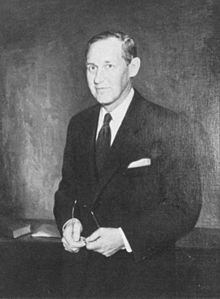Harry Hopkins
American politician, 8th United States Secretary of Commerce, assistant to President Franklin Delano Roosevelt (1890-1946)
Harry Lloyd Hopkins (August 17, 1890 – January 29, 1946) was one of Franklin Delano Roosevelt's closest advisers. He was one of the architects of the New Deal, especially the relief programs of the Works Progress Administration (WPA), which he directed and built into the largest employer in the country. In World War II he was Roosevelt's chief diplomatic advisor and troubleshooter and was a key policy maker in the $50 billion Lend-Lease program that sent aid to the allies.

| This article about a political figure is a stub. You can help out with Wikiquote by expanding it! |
Sourced
edit- Communities now find themselves in possession of improvements [resulting from the WPA] which even in 1929 they would have thought themselves presumptuous to dream of... [but] everywhere there had been an overhauling of the word presumptuous. We are beginning to wonder if it is not presumptuous to take for granted that some people should have much, and some should have nothing; that some people are less important than others and should die earlier; that the children of the comfortable should be taller and fatter, as a matter of right, than the other children of the poor.
- Spending to Save: The Complete Story of Relief (1936), p. 184
- They are damn good projects - excellent projects. That goes for all the projects up there. You know some people make fun of people who speak a foreign language, and dumb people criticize something they do not understand, and that is what is going on up there - God damn it!
- Stated at a press conference (April 4, 1935); reported in Robert E. Sherwood, Roosevelt and Hopkins (1948), p. 60. Sherwood says, "The reports of this conference quoted Hopkins as saying that 'the people are too damned dumb', and this phrase was given plenty of circulation in the press" (p. 61). He adds in a footnote that "it will be seen from the transcript of his remarks that this particular statement was directed not at the people but at the critical orators" (p. 938). Also reported in Paul F. Boller, Jr., and John George, They Never Said It: A Book of Fake Quotes, Misquotes, & Misleading Attributions (1989), p. 48-49; Boller and George also note that the quote was quickly misreported as "The people are too damn dumb to understand".
Misattributed
edit- Tax and Tax, spend and spend, elect and elect.
- Asserted by theatrical producer Max Gordon and printed by conservative newspaper columnist Frank R. Kent in the 1930s; Gordon later admitted that Hopkins had not said what was claimed; reported in Paul F. Boller, Jr., and John George, They Never Said It: A Book of Fake Quotes, Misquotes, & Misleading Attributions (1989), p. 49-51.
- On the other hand, in an exchange of letters published in the New York Times on November 24, 1938, Harry Hopkins wrote to the Times insisting he never said this quotation but Arthur Krock, a writer for the Times, countered that he had personally verified the source of the quote from a close friend of Hopkins and that Hopkins had made the remark in all seriousness at a Yonkers racetrack. Krock surmised in his counter-letter that Hopkins was trying to avoid embarrassment as he (Hopkins) was up for a Cabinet position, Secretary of Commerce. Max Gordon later identified himself as the original source for Arthur Krock and denied these were the exact words of Hopkins but claimed the words contained the gist of what Hopkins said. See New York Times, https://www.nytimes.com/1938/11/24/archives/letters-to-the-times-delayed-mail-deliveries-methods-of-handling.html?scp=4 For a full analysis of the origins of the quotation see: https://www.barrypopik.com/index.php/new_york_city/entry/tax_and_spend
- Asserted by theatrical producer Max Gordon and printed by conservative newspaper columnist Frank R. Kent in the 1930s; Gordon later admitted that Hopkins had not said what was claimed; reported in Paul F. Boller, Jr., and John George, They Never Said It: A Book of Fake Quotes, Misquotes, & Misleading Attributions (1989), p. 49-51.